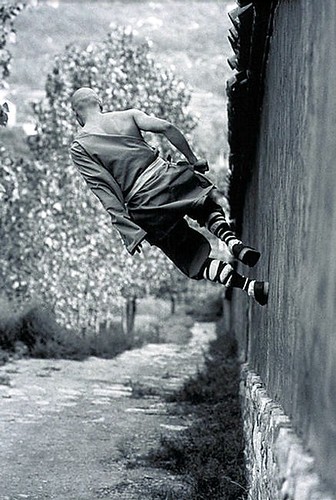
From the recent New Yorker article The Science and Imagination Behind Modern Dessert, which is well worth your time in its entirety:
Did he have a dream dessert that he had tried and failed to perfect? He nodded. “Yes, there’s one I’m working on. I haven’t really . . . perfected it yet. You see, I’m a big fan of F.C. Barcelona”—the soccer team—“and I wanted to make a dessert that would re-create the emotions Lionel Messi feels when he scores a goal.” Messi is the great Argentine striker who stars for Barcelona. “I feel I’m close. Could I try it out on you at the end of lunch?”
The desserts came around. And here was the real thing, here were true desserts: not dancing nimbly on the edge between sweet and salty, like Albert Adrià’s, but plain old-fashioned sweets touched by the invention and audacity of a liberated imagination. There was watermelon rind with bitter almonds and tarragon; a hot lemon-mint eucalyptus liquid that, as it was poured, solidified into a small, sweet iceberg. Then lemon custard and granita, with the floral scents in a small cup alongside: you eat and smell by turns. Lemon zest, pure distilled mint flowers. And then an apricot ice-cream bombe with a spun-sugar shell and apricot foam inside and an apricot sabayon inside that.
Finally, the server arrives with the Messi dessert, as Jordi fusses anxiously in the background. He presents half of a soccer ball, covered with artificial grass; the smell of grass perfumes the air. On the “grass” is a kind of delicately balanced, S-shaped, transparent plastic teeter-totter—like a French curve—with three small meringues on it, and a larger white-chocolate soccer ball balancing them on a protruding platform at the very end. A white candy netting lies on the grass near the white-chocolate ball.
Then, with a cat-that-swallowed-the-canary smile, the server puts a small MP3 player with a speaker on the table. He turns it on and nods.
An announcer’s voice, excited and frantic, explodes. Messi is on the move. “Messi turns and spins!” the announcer cries, and the roar of the crowd at the Bernabéu stadium, in Madrid, fills the table. The server nods, eyes intent. At the signal, you eat the first meringue.
“Messi is alone on goal!” the announcer cries. Another nod, you eat the next scented meringue. “Messi shoots!” A third nod, you eat the last meringue, and, as you do, the entire plastic S-curve, now unbalanced, flips up and over, like a spring, and the white-chocolate soccer ball at the end is released and propelled into the air, high above the white-candy netting.
“MESSI! GOOOOOAL!” The announcer’s voice reaches a hysterical peak and, as it does, the white-chocolate soccer ball drops, strikes, and breaks through the candy netting into the goal beneath it, and, as the ball hits the bottom of a little pit below, a fierce jet of passion-fruit cream and powdered mint leaves is released into your mouth, with a trail of small chocolate pop rocks rising in its wake. Then the passion-fruit cream settles, and you eat it all, with the white-chocolate ball, now broken, in bits within it.
You feel . . . something of what Messi must feel: first, the overwhelming presence of the grass beneath his feet (he’s a short player); then the tentative elegance of acquired skill, represented by the stepladder of the perfumed meringues; and, finally, the infantile joy, the childlike release, of scoring, represented by the passion-fruit cream and the candy-store pop rocks. I saw Jordi watching us from the kitchen entrance. He had the anxious-shading-into-delighted look that marks the artist.

No comments:
Post a Comment